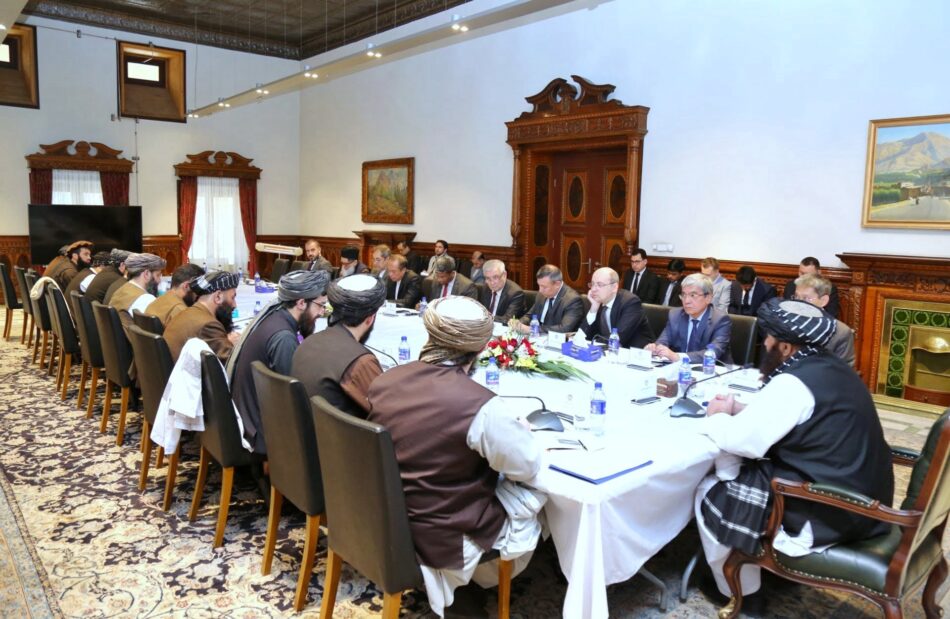Next week, Kabul is set to host a meeting with representatives from Iran, Pakistan, China, and Russia to discuss Afghanistan. The Deputy Minister of Foreign Affairs of Iran, Seyed Rasul Mousavi, shared on X, “Next week, Kabul will witness significant regional diplomatic activity. The regional meeting in Kabul, featuring participation from Iran, Pakistan, Russia, and China, scheduled before the Doha meeting on February 18, underscores the special focus of Afghanistan’s neighbors on the peace, Stability, and prosperity of the Afghan people and regional security.”
The Taliban government needs to provide more details about the meeting’s agenda and participants in Kabul. However, Sohail Shaheen, head of the Taliban government’s Doha office, mentioned that the meeting is planned for Monday.
Previously, on January 22, Zamir Kabulov, without specifying the meeting’s location, stated that besides Russia, representatives from China, Iran, and Pakistan would participate, focusing on the security situation in Afghanistan and the region.
This meeting in Kabul precedes a United Nations conference on Afghanistan in Doha.
The upcoming conference in Doha on Afghanistan
UN Secretary-General Antonio Guterres plans to host a conference of special representatives on February 18-19. The General Secretary’s spokesperson, Stéphane Dujarric, explained, “The Secretary-General intends to build on the conversations among member states and regional bodies concerning Afghanistan. This conference aims to bolster international collaboration in a coherent and structured manner, including revisiting the suggestions from an independent evaluation on Afghanistan.” He added that this meeting seeks to continue the dialogue initiated in Doha last May and is in line with a UN Security Council resolution advocating the appointment of a special envoy to Afghanistan.
UN Security Council Resolution 2721, adopted on December 29, 2023, mandates the Secretary-General to appoint a Special Envoy for Afghanistan, focusing on human rights and gender issues, underscoring the critical role of the UN Assistance Mission there. Supported by 13 members, with China and Russia abstaining, the resolution aspires for a peaceful, globally integrated Afghanistan that includes the active participation of Afghan women. It stresses the execution of an independent assessment’s recommendations and a structured global engagement. The resolution emphasizes Afghan sovereignty, the concerns regarding the Taliban’s policies, and the necessity for a united international effort to improve the situation in Afghanistan.
Notably, the Taliban, which was not invited to the UN-led discussion on Afghanistan in Doha in May 2023, has been invited to participate in the forthcoming meeting.
Maulvi Abdul Kabir, the political deputy of the Taliban’s prime minister, affirmed their inclusion in the Doha meeting following a dialogue with Paul Klouman Bekken, Norway’s Chargé d’affaires to Afghanistan, on January 25 in Kabul. Abdul Kabir expressed his administration’s desire for relations rooted in mutual respect with all nations, including the European Union and the United States.
Paul Klouman Bekken shared insights from his meeting with Deputy Prime Minister Kabir on Twitter, stating, “Today’s productive meeting with Deputy PM Kabir acknowledged the security improvements over the past two years.” He pointed out that UN Security Council Resolution 2721 offers the de facto government a pathway out of international isolation. “Norway is prepared to support efforts towards normalizing relations with the global community, with a focus on mutual respect, adherence to international laws, including human rights, and governance that mirrors the diversity of the Afghan society,” Bekken further noted.
Deadlock between the international community and the Taliban government
The relationship between the international community, especially Western nations, and the Taliban-led government in Afghanistan has been marked by tension since the Taliban’s ascendance to power.
The international community’s profound concern revolves around human rights under Taliban governance, particularly the restrictions on girls’ education and women’s employment. Concurrently, the Taliban is seeking global acknowledgment as Afghanistan’s legitimate government.
To date, no nation has officially recognized the Taliban government, and Afghanistan’s seat at the United Nations remains with the prior administration. Nevertheless, countries like Iran, Russia, China, Pakistan, and a few others have engaged with Taliban diplomats within their embassies in Afghanistan and have kept their diplomatic missions operational in Kabul.
Observers are keenly awaiting the outcomes of the Doha meeting, anticipating that it may exert pressure on the Taliban to honor human rights, including those of girls and women, and to incorporate diverse political and ethnic groups into its governance structure.
The Taliban, for its part, aims to persuade the international community, particularly Western countries, to recognize their regime. Despite these efforts, the considerable divide between the two sides suggests that the impending meetings in Doha and Kabul may take time to resolve the deadlock between the global community and the Taliban-led government in Afghanistan. Further dialogues, diplomatic initiatives, and negotiation flexibility are essential for fostering normal diplomatic relations.





